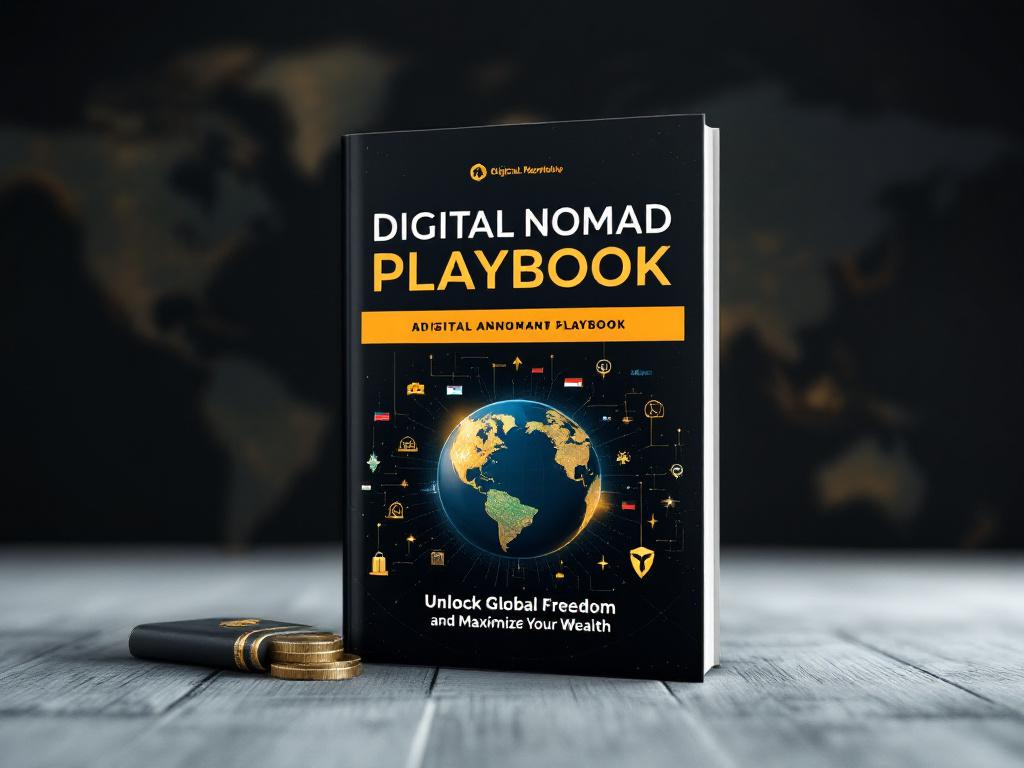Website designed with the B12 website builder. Create your own website today.
Start for free
A Comprehensive Guide to Digital Nomads in Malaysia
The rise of digital nomadism has been one of the most significant global shifts in recent years, allowing professionals to work from anywhere with an internet connection.
Malaysia, with its rich culture, diverse environments, and affordable living, has become an increasingly popular destination for digital nomads from around the world.
Whether you're considering Malaysia as a base for your remote career or simply curious about the digital nomad lifestyle here, this blog provides a comprehensive overview.
While Malaysia offers many advantages for digital nomads, there are a few challenges to keep in mind:
Malaysia is an excellent destination for digital nomads seeking an affordable, vibrant, and culturally rich environment.
With good infrastructure, a range of coworking spaces, a growing expat community, and stunning natural beauty, it offers a great balance for work and leisure.
While there are challenges, such as visa limitations and the tropical climate, the positives outweigh the drawbacks for most remote workers.
Whether you’re a seasoned nomad or just starting out, Malaysia provides a diverse and welcoming environment that will help you thrive in your remote career.
If you’re planning to make Malaysia your base, you’re in for a rewarding experience both professionally and personally!

A Comprehensive Guide to Digital Nomads in Malaysia: Costs, Opportunities, and How SFP Affiliates Work Internationally
Malaysia has rapidly become a popular destination for digital nomads, offering a combination of affordable living, a thriving tech ecosystem, and an exceptional lifestyle.
As more professionals seek freedom in their work, Malaysia provides the perfect balance of modern amenities and low living costs. With the Startup Factory Program (SFP), SFP Affiliates can not only thrive locally but also operate internationally, particularly targeting ASEAN and global clients.
This article will provide insights into the costs of living as a digital nomad in Malaysia, how SFP Affiliates support international clients, and the global opportunities available through the SFP Affiliate Program.
For reference, we will include the costs in Malaysian Ringgit (RM), USD (US Dollar), and EUR (Euro) to give a broader perspective for international digital nomads.
Accommodation costs are a significant part of any digital nomad's budget. Malaysia, however, offers a variety of affordable options that cater to both local and international needs, making it a prime destination for SFP Affiliates working with ASEAN and global clients.
SFP Tip: As SFP Affiliates scale their businesses and commissions, these accommodation costs will become increasingly affordable, offering you a comfortable base for growing your operations both locally and globally.
Food in Malaysia is a highlight of living here, offering a range of options from budget-friendly street food to international dining. This is important for SFP Affiliates, especially when working with both ASEAN and global clients, as eating out can be a way to network and build relationships.
SFP Tip: With growing commissions from the SFP Affiliate Program, you’ll be able to afford greater variety in food while still focusing on serving ASEAN and global clients.
Transportation is one of the easiest expenses to manage in Malaysia, offering affordable options for SFP Affiliates working with both local and international clients.
SFP Tip: As your affiliate commissions grow, the transportation costs to manage your global operations will become more affordable, giving you more mobility to serve ASEAN and international clients.
Coworking spaces are vital for digital nomads, offering both a productive environment and opportunities to network. Malaysia has numerous coworking spaces that cater to digital professionals, providing access to high-speed internet and meeting rooms.
The daily pass cost for coworking spaces in Kuala Lumpur varies depending on location and amenities.
At Co-labs Coworking (The Starling, PJ), prices range from RM 49 to RM 60 per day (approximately $10–$13 USD or €9–€11 EUR). Common Ground, with multiple locations, charges between RM 60 and RM 80 per day ($13–$17 USD or €11–€15 EUR). WORQ, available in KL, Subang, and PJ, offers daily passes for RM 40 to RM 50 ($8–$11 USD or €7–€9 EUR).
For premium options, WeWork at Equatorial Plaza in KL costs around RM 90 to RM 120 per day ($19–$26 USD or €17–€23 EUR). Komune Co-working in KL Eco City and Bangsar is more affordable, with a range of RM 35 to RM 50 ($7–$11 USD or €6–€9 EUR). Colony, located at KL Sentral and KLCC, charges between RM 75 and RM 90 ($16–$19 USD or €14–€17 EUR). DOJO KL in Bukit Bintang falls in the RM 40 to RM 55 range ($8–$12 USD or €7–€10 EUR).
Some coworking spaces provide complimentary coffee, high-speed internet, and access to meeting rooms. If you plan to use a space for multiple days, opting for a weekly or monthly membership can be more cost-effective.
The cost of meeting rooms and other facilities in Kuala Lumpur's coworking spaces varies based on the location, amenities, and duration of use.
Most coworking spaces also offer free coffee, high-speed internet, printing services, and lounge areas. Some premium locations provide nap pods, fitness rooms, and rooftop access for an extra fee.
SFP Tip: As you progress in the SFP Affiliate Program, you can cover these coworking space costs, which are essential for managing both local and global operations with ease.
Living in Malaysia as a digital nomad provides ample opportunities to unwind and maintain a healthy lifestyle, which is crucial for productivity. From leisure activities to healthcare, Malaysia offers affordable options for SFP Affiliates.
SFP Tip: With the income generated from SFP Affiliate commissions, you’ll be able to maintain a healthy lifestyle while supporting your growing business operations across ASEAN and internationally.
One of the key benefits of being an SFP Affiliate is the ability to serve clients not only within Malaysia but also across ASEAN and global markets. With Malaysia's strong internet infrastructure and strategic location, it is an ideal hub for managing international client relations.
SFP Tip: As you grow in the SFP Affiliate Program, your ability to work with both ASEAN and global clients will significantly increase. The tools and training provided by SFP enable you to manage these operations efficiently and profitably.
Malaysia is an ideal destination for digital nomads, particularly those working as SFP Affiliates. With affordable living costs, a vibrant tech ecosystem, and access to both ASEAN and global clients, digital nomads can build and scale their businesses efficiently.
Whether you're just starting out or looking to expand internationally, the SFP Affiliate Program provides the tools and opportunities necessary to succeed in the global marketplace.

The D-Rantau Program (DE Rantau Nomad Pass) Process for Digital Nomads and SFP Affiliates in Malaysia
Malaysia has been increasingly attracting digital nomads due to its affordability, modern infrastructure, and the government’s proactive stance in supporting remote workers.
One of the most exciting developments is the D-Rantau Program, which enables digital nomads to live and work legally in Malaysia while enjoying the flexibility of working with ASEAN and global clients.
For SFP Affiliates, the D-Rantau Program offers an ideal opportunity to expand operations, tap into the Malaysian market, and build a stronger international presence.
Here’s a comprehensive guide to understanding the D-Rantau process and how it benefits SFP Affiliates working internationally and for ASEAN and global clients.
The D-Rantau Program (DE Rantau Nomad Pass) is a government initiative in Malaysia aimed at attracting digital nomads and remote workers to live and work in Malaysia. Under this program, digital nomads who work for international clients or own businesses outside of Malaysia can apply for a special visa that allows them to stay and work in the country for an extended period.
For SFP Affiliates, this program provides an opportunity to manage ASEAN and global operations from within Malaysia while enjoying the lifestyle benefits and access to the business-friendly environment.
The D-Rantau visa ( DE Rantau Nomad Pass ) is designed for remote workers, freelancers, and entrepreneurs who are employed by international companies or run businesses that are not registered in Malaysia. This program is particularly beneficial for SFP Affiliates looking to work with ASEAN and global clients while living in Malaysia.
Eligibility criteria typically include:
SFP Bootcamp 1+2: 24 sales per month or Full SFP Bootcamp: 10 sales per month
The D-Rantau program is ideal for digital nomads working with ASEAN and global clients since it allows them to live and work in Malaysia legally while maintaining their remote job.
Before applying for the D-Rantau visa (DE Rantau Nomad Pass) , you will need to ensure that you have the necessary documentation, including:
You can submit your application through the Immigration Department of Malaysia or through authorized agents for the D-Rantau program. This process is typically done online, and there may be a consultation fee involved.
To apply for the D-Rantau program, you can submit your application online through the official channels:
SFP Affiliates should include their affiliation with the SFP Affiliate Program, as this can serve as proof of their work arrangements for international clients.
The D-Rantau visa application typically costs between RM1,000 to RM1,500 (approx. USD220 to USD330 / EUR200 to EUR300). The fee may vary depending on the duration of the visa, which can range from 1 year with the option for an extension.
Processing times for the D-Rantau visa can vary but typically take around 2-3 weeks. Once approved, you will receive your visa electronically or in the form of a visa sticker in your passport.
After your visa is approved, you will be able to enter Malaysia and begin working remotely from within the country. The D-Rantau program ensures that you can legally stay and work in Malaysia while being based in the ASEAN region or working globally.
The D-Rantau program ( DE Rantau Nomad Pass ) is particularly beneficial for SFP Affiliates, especially those looking to serve clients in ASEAN or global markets. Here’s how D-Rantau benefits SFP Affiliates:
As an SFP Affiliate, you will likely work with clients from various countries across ASEAN and globally. The D-Rantau visa provides an opportunity to establish a base in Malaysia and manage your affiliate operations, even while working remotely for clients. Whether you are serving local Malaysian businesses or international clients, Malaysia’s thriving digital economy offers many opportunities for SFP Affiliates to grow their businesses.
Malaysia offers affordable living costs compared to many Western countries. For SFP Affiliates working with clients worldwide, the ability to live in Malaysia while earning in USD or EUR allows for a higher standard of living with more financial flexibility. Malaysia’s affordable housing, food, and transportation make it an ideal location for digital nomads.
Malaysia boasts modern infrastructure, excellent internet connectivity, coworking spaces like Co-labs for SFP Affiliates, and a strong network of business opportunities. The D-Rantau program enables digital nomads to take full advantage of these resources, allowing you to work efficiently while handling ASEAN and global clients.
The SFP Affiliate Program allows digital nomads to engage with local and international entrepreneurs and startups. Being part of the SFP Affiliate network gives digital nomads the chance to collaborate with like-minded individuals from ASEAN and around the world, potentially opening up opportunities to expand business operations and client reach.
For SFP Affiliates working with clients across ASEAN and globally, the D-Rantau Program is an excellent opportunity to establish a stable, long-term presence in Malaysia. The process is straightforward and provides the flexibility to work remotely while enjoying Malaysia’s affordable cost of living, business-friendly environment, and vibrant culture.
By participating in the D-Rantau program, SFP Affiliates can expand their operations, manage clients internationally, and enjoy a higher quality of life while growing their businesses. Whether you're looking for short-term work or long-term residency, the D-Rantau visa offers a pathway for remote work professionals to thrive in Malaysia.

💰 Earn commissions (10%-33%) promoting tech & digital transformation solutions.
🌍 Work remotely for global & ASEAN clients.
📈 No experience needed – free training provided!
To successfully sync your timeline for applying to the SFP Affiliate Program alongside the D-Rantau Visa, follow these strategic steps:
✅ Understand the D-Rantau Visa (DE Rantau Nomad Pass) eligibility (Must be a remote worker or freelancer working with international clients).
✅ Review the SFP Affiliate Program benefits (Global sales commissions, international clients, and passive income).
✅ Gather documents required for the D-Rantau visa (passport, proof of remote work, financial statements, etc.).
✅ Sign up for the SFP Affiliate Program (Free or Paid Option).
✅ Complete onboarding training to understand how to promote tech solutions, startup programs, and digital transformation services.
✅ Start marketing and sales activities to establish proof of remote work with international clients.
✅ Use SFP Affiliate work as a source of remote income.
✅ Document international commissions and client interactions (emails, invoices, or contracts).
✅ Ensure earnings align with D-Rantau Visa’s minimum income requirement (USD 24,000 annually / USD 2,000 monthly).
✅ Submit DE Rantau Nomad Pass application online via Malaysia Digital Economy Corporation (MDEC) portal.
✅ Pay the visa processing fee and await approval (2-6 weeks).
✅ If approved, prepare for relocation to Malaysia.
✅ Upon visa approval, enter Malaysia and continue expanding remote income via SFP Affiliate.
✅ Take advantage of DE Rantau Nomad Pass | D-Rantau perks (networking, tax benefits, cost of living advantages).
✅ Build partnerships and grow your earnings through referrals and international clients.
✔ Meets the remote income criteria required for D-Rantau. ( DE Rantau Nomad Pass )
✔ Provides a long-term, scalable remote business model.
✔ Enables global sales & commissions, supporting digital nomad life.
✔ Allows Malaysian residency while working internationally. 😊
QUESTION: Are SFP Affiliates bound by the local Malaysian Labour Law?
No, SFP Affiliates Marketers are not bound by Malaysian local labor laws because they operate as independent affiliates (not employees) under a commission-based model. Here’s why:
✅ SFP Affiliates work as freelancers or independent marketers, not employees.
✅ They earn commissions based on sales performance (Cost Per Sale, Cost Per Lead, etc.).
✅ No fixed salary, working hours, or direct employer-employee relationship.
✅ Since SFP Affiliates sell to international clients, they are not subject to local employment restrictions.
✅ They can work remotely, even from Malaysia, under D-Rantau Visa (which requires international income).
🔹 If based in Malaysia for an extended period, affiliates may need to declare income under tax laws.
🔹 Income earned from international clients may be exempt from Malaysian taxes (depending on residency status).
🔹 If operating as a local business or agency, tax registration may be required.
✅ D-Rantau visa holders must work for international clients, not Malaysian clients.
✅ SFP Affiliate activities align with D-Rantau’s remote income criteria, avoiding local labor law conflicts.
SFP Affiliates are not bound by Malaysian labor laws as they work independently. However, they must comply with visa, tax, and income declaration requirements if staying in Malaysia long-term. (more than 182 days or 6 months)
The D-Rantau Nomad Pass or Visa, designed for qualified foreign digital nomads, is a Professional Visit Pass valid for 3 to 12 months. It can be renewed for an additional 12 months, allowing a total stay of up to 24 months in Malaysia. 😊

Solo SFP Affiliates vs Family SFP Affiliates in the D-Rantau Visa: Which One Is Right for You?
As the world continues to embrace remote work, Malaysia is fast becoming one of the top destinations for digital nomads, offering visa programs tailored to support both solo entrepreneurs and those wishing to travel with their families.
Among the most prominent program and visa options are with the SFP Affiliate Program and the D-Rantau Visa (DE Rantau Nomad Pass), two choices that cater to remote workers. But what happens when you’re considering a digital nomad lifestyle with a family?
In this blog, we’ll dive into the differences between solo SFP Affiliates and family-based SFP Affiliates under the D-Rantau Visa and help you figure out which one might be the best fit for your lifestyle and work goals.
The SFP (Startup Factory Program) Affiliate is an excellent program choice for remote workers, freelancers, and entrepreneurs looking to work in Malaysia.
Whether you’re just getting started in your remote work career or you’re already established, the SFP Affiliate program provides the flexibility to live in Malaysia while working remotely for a foreign employer or as an independent contractor.
As an SFP Affiliate, you gain access to a network of like-minded entrepreneurs and digital nomads, with opportunities to grow your skills and business. The program also offers various perks, including access to resources for business development, networking, and connecting with the local startup ecosystem.
Solo digital nomads are typically independent workers who enjoy the flexibility of choosing their work environment, collaborating with clients remotely, or running their own business. For solo SFP Affiliates, Malaysia offers a wealth of benefits.
For digital nomads with families, the D-Rantau Visa offers a unique solution that allows remote workers to live and work in Malaysia alongside their loved ones.
The D-Rantau Visa is a more family-friendly option compared to the standard SFP Affiliate Visa and has specific provisions for spouses and children.
The decision between choosing the solo SFP Affiliate Program with Solo D-Rantau Visa and the family-inclusive D-Rantau Visa largely depends on your personal situation and what you're looking for in a digital nomad lifestyle.
The income requirement for Malaysia's DE Rantau Nomad Pass (D-Rantau Visa) varies based on the applicant's professional background:
These income thresholds apply to the primary applicant, regardless of whether they are applying alone or with dependents. However, when including family members, additional application fees are incurred:
While the income requirement remains consistent for the primary applicant, it's essential to ensure sufficient financial means to support accompanying dependents during their stay in Malaysia.
Both visa options are excellent choices depending on your circumstances. Whether you’re traveling solo or with family, Malaysia offers a thriving ecosystem for digital nomads.
The SFP Affiliate Program With Solo D-Rantau Visa is great for solo workers looking to explore the country and join a vibrant community, while the Family D-Rantau Visa ensures that families can stay together and enjoy everything Malaysia has to offer while working remotely.
Consider your goals, family situation, and financial requirements when deciding which visa best fits your lifestyle.
📌 Ready to start as free Bronze? Apply for SFP Affiliates Now
📌 Or Ready to start as Paid Member? Subscribe Now! Here
📌 Need a Visa? Apply for the D-Rantau Visa Here
All you need to know about SFP Affiliate here: SPF AFFILIATE PAGE
Stay updated on our news and events! Sign up to receive our newsletter.